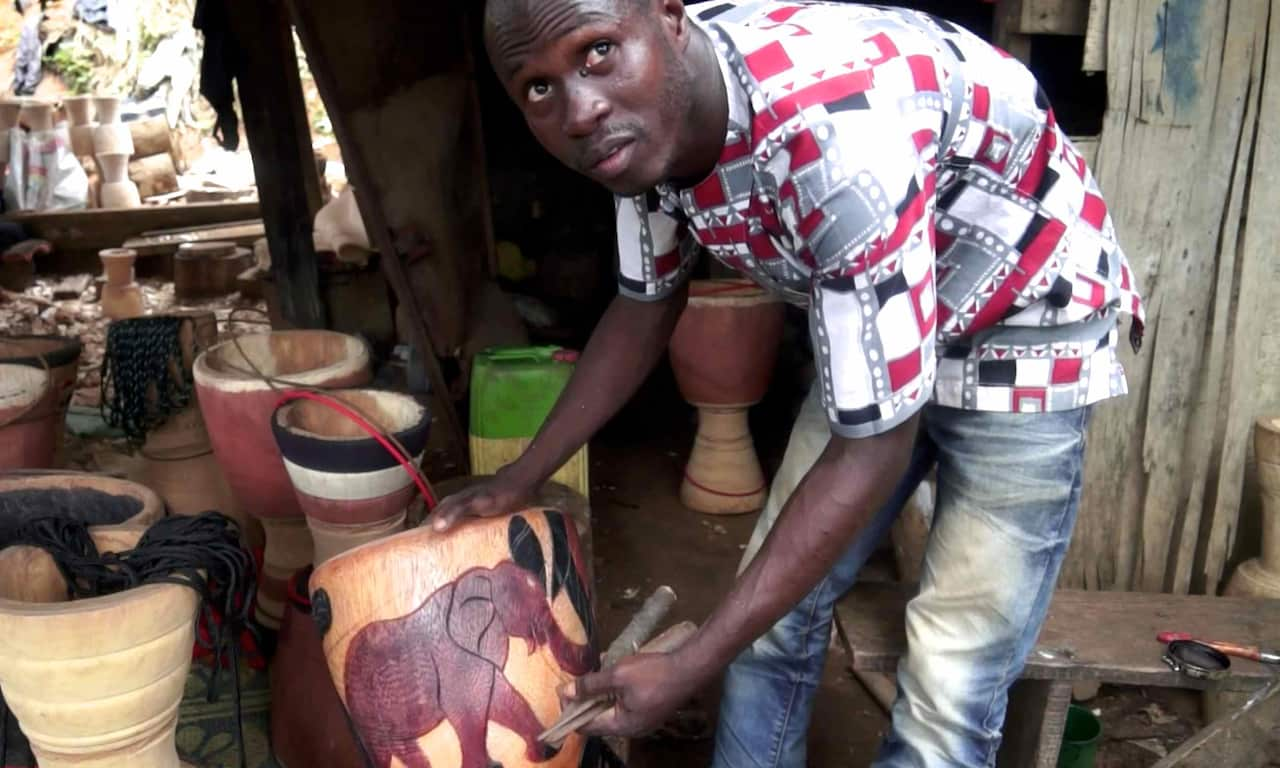In remote West African villages, communities are the guardians of culture.
Music and dance are central to that culture.
A group of artists from the Ivory Coast have flown to the French capital this week despite fears of terrorist attacks in concert venues.
Their colleagues, currently on tour throughout Victoria in the Cirque Africa show, are introducing Australians to traditional dance and song from the African continent.
From the Ivory Coast to Paris
Many Ivorian artists are from poverty-stricken regions and the chance to perform in Paris was too overwhelming for them to be put off by the threat of terrorism.
Percussionist Ousmane Sanogo said he had come too far to give up on his dreams.
“I want to be a big international circus artist and prove to people that the art comes from my body when I express it, wherever it takes me, such as in France,” he told SBS.
“Here, it is very hard to earn a living as an artist. I have been training for years, been tricked by some people who made false promises, it’s not easy.
"Here in the Ivory Coast we have so much art, so much traditional music, but often artists don’t have the strength, the money or the ability to organise themselves in order to succeed.”
'A big honour'

Ivorian Percussionist Ousman Sanogo onstage in France. Source: Cirque Phénix
Their manager in Africa, Panelle Ekponon, helped them through the red tape at the French embassy to achieve the green light from authorities.
“Here we have three visas,” he explained.
“It is really a big honour because these visas - every artist wants them.
“But it takes a lot of work. They need to work, and work, and work and when you are noticed, you are taken immediately for international tours.
“To be able to perform in the Cirque Phénix in France, is like selling the culture of the Ivory Coast because it shows the competency and the real culture of our country. Those who succeed go on to tour everywhere: to the United States, Australia, France, and nearly all over the world.”
“We only leave the village when we are called together as a group, we perform at parties, and funerals."
Bi-Romain Dje Sehi, a traditional Zaouli dancer, was lost for words after receiving his visa last week in Abidjan.
“I’ve just come back with this,” he said as he held up his visa.
“They gave me this! I’m so happy.”
Upon asked how he was feeling, Mr Dja Sehi laughed as he tried to hold back tears. Chiefs in central Ivory Coast gave us rare film access to the Zaouli dance - honouring a female deity in tribal tradition.
Chiefs in central Ivory Coast gave us rare film access to the Zaouli dance - honouring a female deity in tribal tradition.

Artist Manager Panelle Ekponon (right) with Zaouli dancer Bi-Romain Dje Sehi (left) after successfully being granted visas for France in Abidjan, Ivory Coast. Source: SBS
The President of Zaouli in the village of Guénfla, Tie bi Youan Charles, said the chance to perform overseas was a dream, likely out of reach.
“We only leave the village when we are called together as a group, we perform at parties, and funerals,” he said.
“We stay in the same house and we do the show together.”

Modernised Zaouli dance performed in France as part of Cirque Phénix. Source: Cirque Phénix
Zaouli dance's evolution since the 1950s
The popularity of the Zaouli dance and music exploded in the 1950s and the original forms are performed in remote Ivorian villages.
Dancers choose from one of seven different themed masks and perform complicated foot movements, dressed in a mesh uniform with the large decorated mask.
“The music makes you smile, makes you dance."
In Guénfla, the dancer’s yellow mask is topped with a serpent and a bird.
“Imagine you came to my house - I would give you something to drink, something to eat, then you leave. And later, I came to your house and you didn’t feed me anything. That’s what the bird did to the snake (on top of the mask). So he waits for the bird as he’s drinking…ready to get his revenge,” Mr Youan explained.
The dance has been modernised by performers in Abidjan and overseas, who slightly alter the colours of the costume and movements.
Boosting demand for African musical instruments
Around 500 artists travel out of the Ivory Coast to perform each year, but many of them are contemporary dance or hip-hop artists, as traditional arts becomes more difficult to market.
Exposure from events like Cirque Phénix in France brings a valuable boost to the economy, including new opportunities for international touring and demand for African musical instruments. Djembe drum-maker in Abidjan, Yakouba Traoré, creates the instruments from logs of wood - between doing his own musical performances in the city.
Djembe drum-maker in Abidjan, Yakouba Traoré, creates the instruments from logs of wood - between doing his own musical performances in the city.

Djembe drum-maker in Abidjan, Yakouba Traoré, with his uniquely decorated instrument. Source: SBS
“When you’re feeling down and you hear the African drums, you feel happy,” he told SBS.
“The music makes you smile, makes you dance. It’s art that I’m making, art of Africa in the Ivory Coast, and that’s all I do.
“Everywhere in Europe, they are asking me to make them drums. In France, in Italy, USA, UK, Germany, I receive orders from everywhere.”
